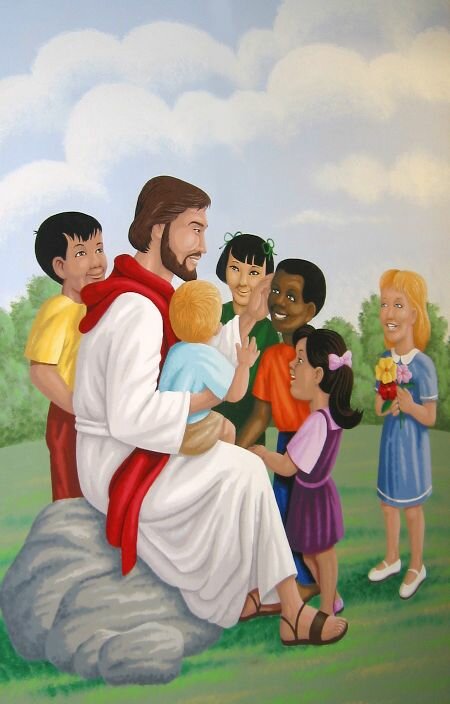Re-Post: Finding Religion: Democrats Talk Like God-fearing Folk
By Joseph Lindsley
The Weekly Standard
IMAGINE a Republican congressman defending traditional marriage by saying, "I am inspired in my public service by St. Paul's admonition against sodomy in his first letter to the Corinthians." Surely, many liberals would raise the alarm of impending theocracy. But House minority leader Nancy Pelosi--a self-described "conservative Catholic" despite her status as a pro-gay marriage, pro-choice San Francisco lefty who as a young girl thought she would rather be a priest than a nun--has lately been encouraging members of her party to couch their political arguments in Biblical terms so as to appeal to the God-fearing.
In a St. Patrick's Day speech on the genocide in Darfur, a topic that unites religious conservatives and liberals, Pelosi said, "The gospel of Matthew is something that drives many of us in our public service." In September of last year, she gave a speech in favor of strengthening the Endangered Species Act, in which she said, "In Isaiah in the Old Testament, we are told that to minister to the needs of God's creation--and that includes our beautiful environment--is an act of worship." And Pelosi, who could be speaker of the House next January, was one of 55 Catholic Democrats in the chamber who signed a "Statement of Principles" in which they expressed union with the "living Catholic tradition." In the statement, released in February through the office of Connecticut's Rosa DeLauro, the signers admit the "undesirability of abortion," without actually committing to changing their party's pro-choice agenda.
Marco Grimaldi, head of the Faith and Progressive Policy Initiative at the liberal Center for American Progress, suggests that this new tic is less a strategic move and more an act of frustration with the perception that Democrats are opposed to religion. "There is a great deal of conversation around a handful of moral issues. I think people who see things differently are really frustrated," he said.
This statement of frustration seems to be an outgrowth of the "Faith Working Group," an effort to coordinate discourse between House Democrats and churchgoers that Pelosi initiated just over a year ago, when the "values voters" of 2004 were still the subjects of liberal nightmares. She chose as the group's chairman Rep. Jim Clyburn, an African Methodist Episcopalian from South Carolina's 6th district, whom she has subsequently selected to serve as chairman of the House Democratic caucus as well. That promotion suggests the importance Pelosi places upon political fellowship with the faithful. The Faith Working Group looks mostly like a behind-the-scenes endeavor, but the "faith page" of the caucus' website provides a glimpse into its undertakings. There, one finds a press release announcing the group's meeting with the president of the U.S. Catholic bishops' conference, a link to Rep. Sherrod Brown's speech on "Faith, Holy Writ and Social Justice," an October statement from the presiding Episcopal bishop calling the Republican budget proposal "tantamount to blasphemy," and, of course, the Catholic "Statement of Principles."
IN AN EARLIER DAY, American Catholics in public life sought to distance themselves from Rome. Now Catholic Democrats wish to appear as though they agree with the church even when they do not. Attempting to avoid having to reconcile this tension with the Church on abortion (and other matters), they express a desire to "speak to the fundamental issues that unite us as Catholics." Citing the "primacy of conscience," but ignoring the Church's view that a good conscience is one in accord with the Church. Instead, they have created their own version of the "fundamental issues" that unite Catholics, excluding the topics on which they dissent.
Using talk of a "consistent moral framework for life," for instance, they create the possibility of making the simple, total rejection of abortion into a complex matter of moral reasoning. Using the Church's complex social teachings, they craft simple admonitions against war and tax cuts. This bit of political alchemy is an inversion of what Alexis de Tocqueville noticed about Catholic Americans 200 years ago. Back then, they portioned their "intellectual world" into two: "in the one [part] they place the doctrines of revealed religion, which they assent to without discussion, in the other they leave those political truths which they believe the Deity has left open to free inquiry." Today, liberal Catholics give unquestioning allegiance to the Democratic party, while maintaining independent minds in matters of Church doctrine.
Pelosi, 66-years-old and a mother of five who did not run for office until her youngest child was nearly an adult, is certainly proud of her faith. In her speech on Darfur, she mentioned a friar in San Francisco whose work with the homeless has inspired her. She has fondly recalled her education at, and maintains relations with, Washington, D.C.'s Trinity College, formerly a Catholic institution, but which has over the years abandoned its faith, even going so far as to shut the doors of its chapel.
But Pelosi also acknowledges that Democrats must make a more concerted effort to convince devout voters that the party is not hostile to them. Catholics, who voted 51 to 48 percent in favor of a second term for President Bush, make up a sizable portion of that demographic. Additionally, liberal Catholic politicians may foresee a need to respond preemptively to critiques from prelates, such as the threats in 2004 to exclude John Kerry from Communion, or the denunciation of Pelosi's support of abortion by the archdiocese of San Francisco in 2002.
The Faith Working Group has made strides in helping Democrats use the language of faith, but will this translate to winning religious votes? Perhaps Howard Dean has the answer.
After Tim Kaine, a religious Catholic, won the Virginia governorship following a campaign during which he frequently and proudly spoke of his faith, Dean told NPR, "We want, like Tim Kaine, to be talking about our faith, and if we're not comfortable talking about our faith, then talk about our moral values." Lurking in that statement, in Pelosi's references to her "conservative Catholicism," and in the "Statement of Principles" is a dilution of the substance of faith so that it becomes something less real, enabling a rhetoric of religion doesn't hold politicians accountable to any tenets but their own. Behind this smokescreen, Nancy Pelosi is able to call her liberal plan to save the environment--over which, according to Genesis, God gave man dominion--an "act of worship," but opposing abortion, which according to the Catholic church her conscience should compel her to do, is an act of intrusion.
Nancy, even Satan can quote the Bible, out of context of course, in order to try to make it support his point of view. Been taking lessions, have you? -ed.









0 Comments:
Post a Comment
<< Home